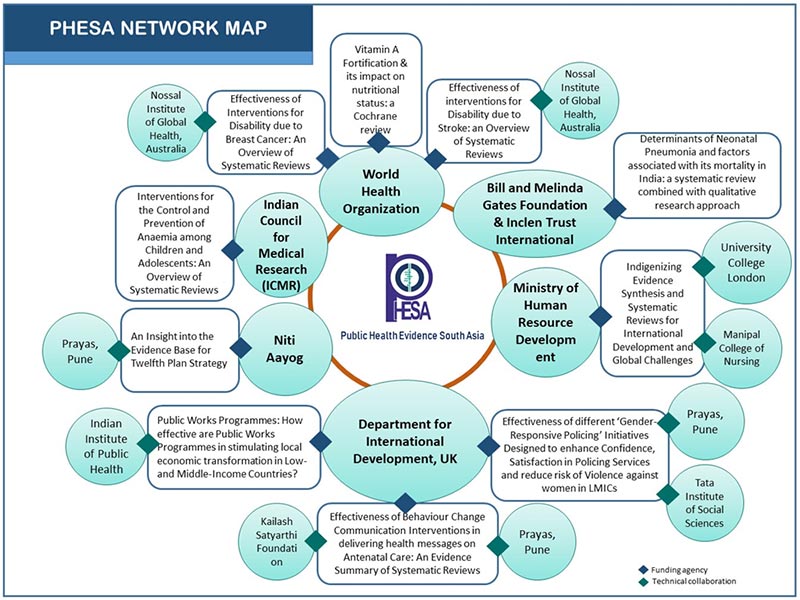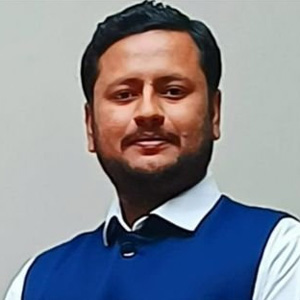PHESA: Bridging the evidence gaps through collaboration
As we celebrate the World Evidence-Based Healthcare (EBHC) Day 2022, we present a case study on Public Health Evidence South Asia (PHESA) and how it complements this year’s theme of ‘Partnerships for Purpose’.
Who are we?
PHESA is an initiative that includes the South Asian satellite of Cochrane Public Health. It is based at Manipal Academy of Higher Education (MAHE) and has been operational in the university since 2013. It became a research centre in 2017 under the Department of Health Information, Prasanna School of Public Health, MAHE, Manipal. MAHE is an Institute of Eminence accorded by the Ministry of Human Resources Development, Government of India. The university has promoted a culture of research and development across its institutions, with an emphasis on evidence synthesis and evidence-informed practice.
PHESA’s goal to facilitate the synthesis, production and dissemination of high-quality evidence on the effects of public health interventions relevant to the South Asian region has prompted it to collaborate with many organisations within and outside the country. Some examples of such collaborations include PHESA working with the Cochrane Public Health Group; University of Groningen; Department of International Development; University College London (UCL); Bill & Melinda Gates Foundation; World Health Organization; Inclen Trust International; University of Melbourne; EPPI Center; International Initiative for Impact Evaluation (3ie); Campbell South Asia, New Delhi, India; Prayas Health Group, Pune, India; Madras Diabetes Research Foundation; and Tata Institute of Social Science.
Over the years, these collaborations have helped us publish over 50 peer-reviewed journal publications and six peer-reviewed reports, as well as conduct various workshops and conferences tailored to the needs of students, professionals and policy enthusiasts.
Partnerships with organisations has given us the opportunity to develop new relationships and opportunities for research. It helped us strengthen networks and work with experienced researchers from different institutions, thereby facilitating knowledge exchange. Working together with other organisations helped us to understand which public health strategies will work best to improve health and well-being, and provide timely evidence to decision-makers to develop and implement effective public health policies. Partnerships encouraged our researchers to focus on and promote research activities, capacity building and deliver quality work, improving the reputation and credibility of the organisations.
An example of this was when our researchers were hosted at UCL through a Scheme for Promotion of Academic and Researcher Collaboration (SPARC) grant and were trained on imparting advanced methods for evidence synthesis. These learnings were further leveraged during our courses and consultancies. The SPARC grant aimed at strengthening and promoting evidence-based policy for India in the area of public health and social and health sciences. As a part of this grant, the faculty from UCL intended to visit Manipal for collaborative workshops between MAHE and UCL. These workshops aimed to consolidate bilateral cooperation through academic and research partnerships between India and the UK, but the ongoing COVID pandemic restricted the implementation of these planned activities. The in-person training program was later organised online instead, and aimed to develop capacity on teaching research synthesis methods and indigenising knowledge for the Indian project team, faculty and researchers at MAHE.
Through partnerships with various institutions and researchers with different skills, budding researchers can gain knowledge and expertise. More funding opportunities were accessed through partnership with various organisations than they were in silos. Partnerships provided opportunities for collaborative activities, like workshops and conferences, and were successful only with mutual support, cooperation, accessibility and trust among the partners. By partnering with different organisations and institutions, we have gained visibility in the field of evidence synthesis. Partnerships provided international collaborative projects, creating knowledge exchange opportunities for researchers.
The PHESA network map depicts all the collaborations it has made to enhance evidence quality to meet optimum standards.

Our mission
PHESA aims to meet the public health evidence needs of the South Asian region. We have been working for nearly a decade on various activities, such as capacity building, including mentoring reviewers and methodologists in the South Asian region on conducting systematic reviews of public health, evidence synthesis products and methodology development, and dissemination of evidence for the community and policymakers. We have grown into an international network with global collaborations, including many universities, NGOs, and public health organisations for evidence synthesis across geographies. We host interns who produce tangible outcomes through grounded learning and thought-provoking publications in indexed journals. We also provide consultations for researchers from other academic institutes.
Our vision
We aim to partner with various government organisations across multiple subject areas to address challenging public health problems faced by low- and middle-income countries and work together to foster a flexible environment that inspires new ideas, debate, change and innovation with a focus on capacity building in public health research. We aspire to venture into the social sciences space where a multidisciplinary team of clinicians, public health specialists and social scientists come together to address complex issues surrounding health. We would like to stimulate debates on the need for capacity building in evidence synthesis methods at a postgraduate level, as a curriculum for this is seldom available in our setting. We envision using automated tools to support evidence synthesis activities and are in the process of ideating the pathways in which we can translate findings from evidence synthesis products to the policy makers’ desks.
Authors
Jisha B Krishnan1, Vijay Shree Dhyani1, Edlin Glane Mathias1, Nachiket Gudi1
1. Public Health Evidence South Asia, Prasanna School of Public Health, Department of Health Information, Manipal Academy of Higher Education, Manipal, India.
Disclaimer
The views expressed in this World EBHC Day Blog, as well as any errors or omissions, are the sole responsibility of the author and do not represent the views of the World EBHC Day Steering Committee, Official Partners or Sponsors; nor does it imply endorsement by the aforementioned parties.
